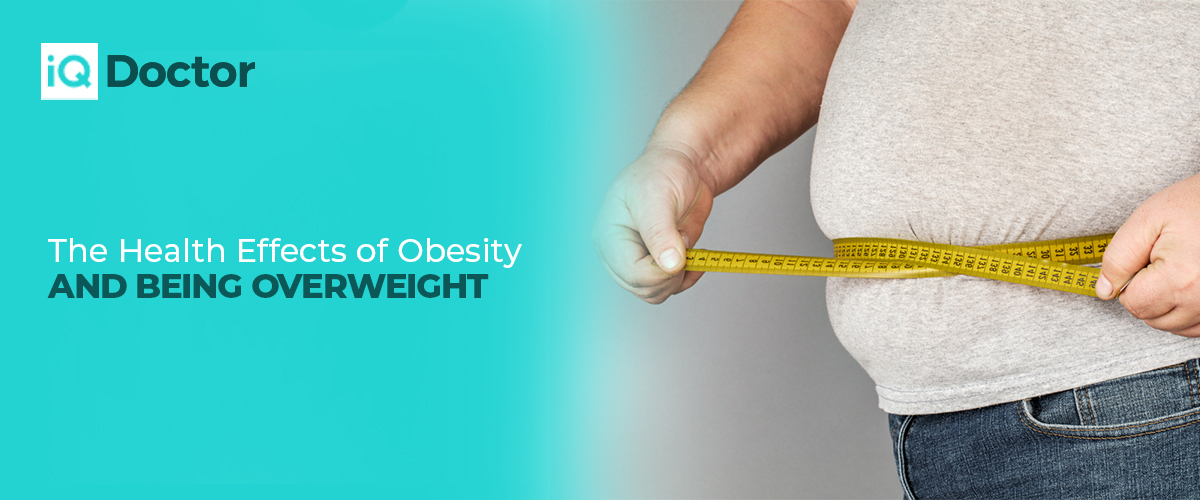The Health Effects of Obesity and being Overweight
09 April, 2021 | Jane Thomas - Marketing

Being overweight or obese has a significant chance of raising your risk for certain physical diseases. Ultimately that can lead to mental problems down the road. The pharmaceutical professionals at iQ Doctor are here to guide you on how to lose those unwanted kilos.
But before you start a diet to improve your self-confidence, let’s take a look at the risks of being overweight.
What Are Some of the Risks of Being Overweight or Obese?
Several health complications become more likely the more overweight or obese you are. Most of these health risks and complications are:
High blood pressure:
Also known as hypertension, high blood pressure is a medical condition in which blood flows through blood vessels with greater force; This puts a tremendous strain on the heart, much more than needed. Over time, it can damage blood vessels and cause minuscule punctures in the capillaries. Also, it raises the overall risk for the person to develop heart conditions. These heart conditions will eventually lead to heart attacks, strokes, kidney diseases, and ultimately, untimely death.
Stroke:
Strokes are situations in which blood supply to your brain suddenly shuts off. They could be caused by many reasons, such as blockage, bursting or tearing of blood vessels, arteries in the neck, or brain. A stroke can have lasting damage to the brain tissues and leave a person paralyzed. The paralysis could be partial or complete. One may even lose the ability to speak altogether. As mentioned above, a higher than average blood pressure of 120/80 mmHg is the leading cause of strokes globally.
We strongly advise you to keep a sphygmomanometer in your home to monitor your blood pressure routinely.
Type 2 diabetes:
Type 2 diabetes is a type of disease that happens when the blood sugar level, also called blood glucose, becomes higher than it is supposed to be. According to studies, an average of 8 out of 10 people with type 2 diabetes is obese or overweight. If the weight issue isn’t dealt with in time, eventually, high blood sugar levels can cause kidney disease, stroke, eye problems, heart disease, nerve damage and various other health issues.
If you are at risk of developing type 2 diabetes, you can deal with the weight issue by losing 5% to 7% of your body weight and exercising regularly every day. This may delay or even prevent the onset of type 2 diabetes.
Diabetes has a snowball effect on other diseases mentioned below.
Heart Disease:
The term ‘heart disease is used as an umbrella term to describe various problems that might arise with your heart. If you suffer from heart disease, you could have a heart attack, sudden cardiac death, angina, or an abnormal heart murmur. Abnormal fat levels in your blood, having high blood pressure, or high blood glucose levels can increase your risk of developing heart disease. Fats in the blood are known as blood lipids, including LDL cholesterol, HDL cholesterol and triglycerides.
If you manage to lose 5% to 10% of your weight, you will lower your risk factors for developing heart disease. For example, if you weigh 200 pounds, you’ll be much safer by losing as little as 10 pounds.
Losing weight can contribute to your health in various ways, such as the decreased risk of high blood pressure, lowered cholesterol levels and improved blood flow through your blood vessels. And that’s not all; your metabolic rate gets positively affected as well.
Metabolic Syndrome:
Metabolic syndrome is a collection of conditions that put you at an increased risk for diabetes, heart disease and stroke. This collection of conditions are:
high blood glucose levels
a lot of fat around your waist
high triglyceride levels in your blood
high blood pressure
low amounts of HDL cholesterol in your blood
Fatty Liver Diseases:
These diseases are medical conditions in which there is a build-up of fat in your liver. Fatty liver diseases include nonalcoholic steatohepatitis (NASH) and nonalcoholic fatty liver disease (NAFLD). These diseases can cause extreme damage to your liver, cause liver failure and cirrhosis.
Gallbladder Diseases:
Being obese or overweight can raise your risk of developing gallbladder diseases, such as cholecystitis and gallstones. The substances that make up the bile in the body can cause gallstones to create an imbalance. If your bile contains excess cholesterol, that might be a reason for the development of gallstones.
Osteoarthritis:
Osteoarthritis is a long-lasting and common medical issue that is identified by pain, swelling and the reduced ability to move your joints. Osteoarthritis risk increases substantially if a person suffers from obesity. Osteoarthritis puts extra pressure on one’s cartilage and joints.
Sleep Apnea:
This is a common sleep-related disorder in which the patient does not have regular breathing while sleeping. People with sleep apnea might even stop breathing entirely for short periods while sleeping. If it is left untreated, then the risk of developing other health issues increases, such as heart disease and type 2 diabetes.
Kidney Disease:
When your kidney becomes diseased, it is damaged and can’t filter blood the way it should normally. Being overweight or obese can raise the risk of developing high blood pressure and diabetes, both of which are the most common causes of developing kidney disease. Even if you don’t suffer from high blood pressure or diabetes, being overweight or obese by itself may increase your risk of developing kidney disease.
A Few Cancers:
The term cancer covers several related diseases. In all forms of cancers, the root problem is that some cells in the body start to divide and multiply without stopping, these then spread into surrounding tissues, which is what a tumour is. Being obese or overweight can increase your risk of developing certain types of cancers.
Pregnancy Issues:
Being overweight or obese can raise the risk of health complications that can occur during pregnancy. Pregnant women suffering from obesity have a greater chance of the following:
Developing preeclampsia, a condition where a pregnant woman has high blood pressure. This can cause serious health problems for both the baby and the mother, if not treated.
Gestational Diabetes:
Requiring a cesarean section, a complicated procedure, commonly known as a C-section, will cause the mother to take a longer time to recover after giving birth.
How Can You Avoid These Health Problems?
If you are overweight or suffer from obesity and want to lose weight fast, Orlistat is a popularly prescribed medication that stops the body from absorbing most of the fats in the food you eat.
At iQ Doctor, we sell Orlistat in its generic form and the branded version called Xenical.
Ask your doctor today whether this medication is suitable for you, and once you have your doctors’ approval, get the medicine and start your process of losing weight.
Remember that simply taking Orlistat alone is not enough to ensure that you lose weight. It is not a sure-fire way of lowering your chances of developing any of the health complications listed above. While Orlistat helps you lose weight in the short term, you need to make long-term changes in your diet to have a lasting effect. Try to add routine physical activity to your lifestyle if you aim to make your weight-loss permanent.
With this systematic approach, your success is guaranteed.
Reviewed By

Omar El-Gohary
The superintendent and lead pharmacist - registration number 2059792.
Omar is passionate about developing healthcare technology to empower our patients.


